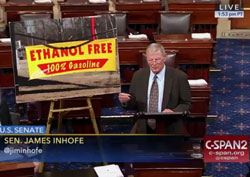 As over 200 corn growers were meeting in the nation’s capitol this week, Sen. Jim Inhofe (R-OK) blasted corn ethanol in an attempt to kill legislation that would allow 15% ethanol blends to be sold year round, instead of being restricted in some areas during the summer months.
As over 200 corn growers were meeting in the nation’s capitol this week, Sen. Jim Inhofe (R-OK) blasted corn ethanol in an attempt to kill legislation that would allow 15% ethanol blends to be sold year round, instead of being restricted in some areas during the summer months.
Inhofe began his speech by complaining that “the fossil fuel industry has long been under assault” from people who want to put it out of business but thanks to the election of President Trump “help has arrived.”
The National Corn Growers Association refuted Inhofe’s remarks that, “Land is increasingly set aside for the production of corn to feed the mandate, and the more corn that is diverted to ethanol production, the less there is for our food consumption and for ranchers who need corn to feed their livestock, making the cost of our food rise,” and “Fuels with corn-ethanol are less efficient than gasoline or diesel—by 27 percent.”
The nation’s corn farmers would like to assure Senator Inhofe that, despite his claims to the contrary, corn productivity has increased significantly over the past 10 years, going from an average of 150 bushels per acre in 2007 to 174.6 bushels per acre in 2016. Today’s efficient farmers produce more than enough corn to meet feed, food, and fuel needs, in an increasingly sustainable manner. Corn farmers are also proud that, based on actual corn and ethanol production experience over the past 10 years, ethanol currently results in 43 percent lower greenhouse gas emissions than gasoline.
Energy Information Administration (EIA) data disputes other claims by the Oklahoma Republican. Inhofe said that “with the shale revolution our dependency on foreign energy has stopped” so the Renewable Fuel Standard is no longer needed. According to EIA, the United States imported just over 10 million barrels per day of petroleum, or about 25 percent of our consumption, with over half coming from OPEC and Persian Gulf nations.
Inhofe also stated that to comply with the RFS, the U.S. has “become reliant on foreign imports of soybeans and ethanol from South America to count towards the RFS.” But, again according to EIA, foreign imports of ethanol have dropped from a high of 11.7 million barrels in 2012 to only 862 thousand last year.
Listen to Inhofe’s remarks here: Sen. Inhofe floor speech
